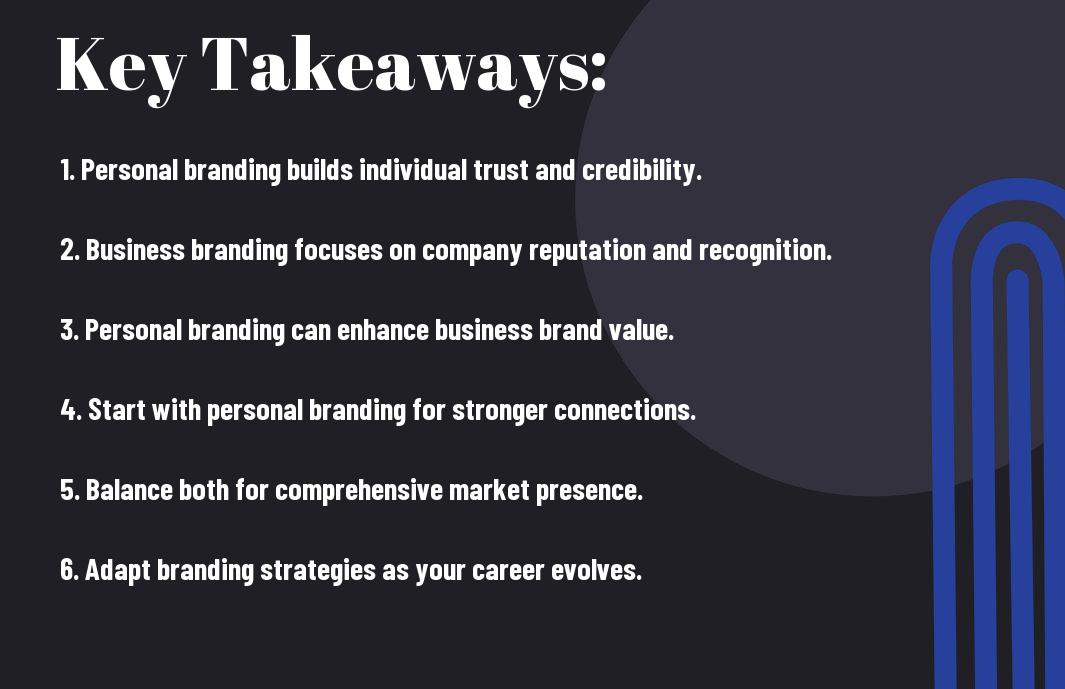
There’s a constant debate in the world of marketing about whether to prioritize personal branding or business branding for your success. In my journey, I’ve found that understanding the distinct advantages of each can significantly impact your professional trajectory. Your personal brand can humanize your business, while a strong business brand can amplify your personal image in the market. In this post, I will explore the benefits of both and help you decide which should take precedence based on your individual goals and aspirations.
Key Takeaways:
- Personal branding establishes your individual reputation and can enhance trust, making it a valuable first step before focusing on your business brand.
- Building a strong personal brand can provide a unique edge to your business branding, as it allows customers to connect with a person rather than just a company.
- Evaluate your goals and audience; if personal connection is key in your industry, start with personal branding; otherwise, you may prioritize business branding based on market needs.

Understanding Personal Branding
The concept of personal branding revolves around the way you present yourself to the world, emphasizing your unique value proposition. It involves curating a consistent image and message that resonates with your target audience, helping you stand out in a crowded marketplace and build meaningful connections. By establishing a powerful personal brand, you can effectively communicate your expertise, values, and personality, ultimately opening doors to new opportunities.
Definition and Importance
Any effective personal branding strategy emphasizes what sets you apart from others in your field. It is imperative because it shapes how people perceive you, influencing their decisions to engage with you on both a personal and professional level. A strong personal brand not only enhances your credibility but also builds trust with your audience, which is vital for success.
Key Elements of Personal Branding
Elements of personal branding include your unique value proposition, consistent messaging, visual identity, and online presence. By defining these elements, you can create a holistic representation of yourself that resonates with your audience. It is imperative to convey authenticity, as people are drawn to brands that reflect genuine values and personality.
Consequently, to develop a strong personal brand, focus on your unique skills and the passions that drive you. Your online presence, such as social media profiles and personal websites, should consistently convey the message you want to project. Crafting a distinctive visual identity and ensuring that your communication remains clear and authentic will enhance your brand’s impact. Additionally, engaging with your audience through meaningful interactions helps build a loyal community around your personal brand, establishing you as a trustworthy authority in your niche.

Understanding Business Branding
It is important to recognize that business branding goes beyond just a logo or a catchy slogan. It embodies the overall image, perception, and personality of your company, shaping how customers and the market perceive your products or services. A strong business brand can instill trust, attract customers, and differentiate you from your competitors, ultimately impacting your long-term success.
Definition and Importance
An effective business brand is more than just a visual identity; it represents the values, mission, and promise of your company to consumers. A well-articulated brand not only enhances recognition and loyalty among your audience but also drives emotional connections that can lead to repeat business and referrals. Understanding the importance of your brand lays the foundation for business growth.
Key Elements of Business Branding
Between the various elements that make up a business brand, you will find your company’s visual identity, voice, and customer experience. Each component plays a significant role in shaping perceptions and forming relationships with your audience. Knowing these elements can help you develop a cohesive strategy that effectively communicates your brand’s message.
Even the smallest detail can influence your brand’s perception. Your logo, color scheme, and typography contribute to your brand’s visual identity, while your brand voice dictates how you communicate with customers. Additionally, the overall customer experience, whether through your website or in-person encounters, can reinforce or undermine your brand’s values. Pay attention to these elements, as they collectively create an impression that will resonate with your audience and set the tone for your brand’s success.
The Interconnection Between Personal and Business Branding
Not many realize how intertwined personal and business branding can be. When you establish a strong personal brand, it can positively affect your business’ reputation and visibility. Conversely, a well-recognized business brand can enhance your personal credibility and professional standing. Understanding this interconnection allows you to leverage both branding strategies effectively, ultimately leading to greater success.
How They Influence Each Other
One significant way personal and business branding influence each other is through trust. When a business leader has a solid personal brand, it generates trust in their company. Likewise, a reputable business can enhance the perceived value of its leadership, fostering credibility and loyalty among customers and employees alike.
Case Studies of Successful Branding
To showcase the power of personal and business branding, here are some notable case studies:
- Elon Musk‘s personal brand has propelled Tesla‘s market value to over $800 billion, demonstrating the impact of strong leadership branding.
- Richard Branson leveraged his adventurous personal brand to build the Virgin Group, now valued at approximately $24 billion.
- Oprah Winfrey transformed her personal brand into a media empire, with OWN recently valued at $295 million.
- Gary Vaynerchuk‘s personal brand fueled the rise of VaynerMedia, surpassing $100 million in revenue.
Personal branding can synergize with business branding to create powerful outcomes. Each case study illustrates that by nurturing a unique personal brand, you can significantly elevate your business presence. For instance, the Virgin Group grew exponentially because Richard Branson is not only recognized for his business acumen but also for his thrilling lifestyle. Similarly, Tesla‘s value skyrocketed thanks to Elon Musk’s influential branding that resonates with innovation and sustainability. Focusing on both aspects can yield astonishing returns.
Assessing Your Priorities: When to Focus on Each
Your decision to prioritize personal branding or business branding ultimately hinges on your current situation and goals. It’s vital to assess where you stand in your industry and what message you want to convey. A strong personal brand may complement your business, but if your company is new or struggling, focusing on business branding first could be more beneficial.
Factors to Consider
Above all, you should evaluate these key factors when deciding:
- Your current role in the industry
- Target audience and their preferences
- Career stage—are you an expert or a newcomer?
- Market demand for personal versus business branding
- Existing reputation of your business or personal brand
Assume that, by taking your time to assess these factors, you’ll make a more informed decision.
Industry-Specific Insights
Among the various sectors, the focus on personal versus business branding can vary significantly. Each industry has its own nuances that dictate a preferred approach. For instance, in the tech sector, strong personal branding can establish your authority and attract clients, while in retail, business branding may take precedence to build a recognizable identity.
Consider the environment you’re operating in: for highly competitive fields, a well-established personal brand can differentiate you from others. Conversely, in industries with strong corporate identities, your business brand might need to lead initially. Pay attention to competitors and market trends, as they can provide insights into what branding method will yield the most positive outcomes for you and your business.
Strategies for Effective Personal Branding
Now that you understand the significance of personal branding, it’s vital to implement effective strategies to stand out. One of the best approaches is to refine your message and consistently communicate it across various platforms. Take the time to identify your unique strengths, values, and goals, and ensure everything you share aligns with your personal brand. This clarity will help you attract the right audience and opportunities.
Building Your Online Presence
Effective personal branding hinges on a robust online presence. Utilize platforms like LinkedIn, Instagram, or a personal website to showcase your skills, experiences, and perspectives. Regularly post relevant content that resonates with your audience, engages with like-minded individuals, and reflects your brand’s core values. A strong online presence not only enhances your visibility but also establishes you as an authority in your field.
Networking and Relationship-Building
After establishing your online presence, the next step is to focus on networking and relationship-building. It’s vital to actively engage with peers, mentors, and industry leaders. Attend events, participate in discussions, and leverage social media to connect. Be mindful of, it’s not just about who you know, but also about building authentic, mutually beneficial relationships.
To cultivate these relationships, I actively seek out opportunities to connect with others in my industry. I make it a point to reach out for coffee chats or virtual meetings, as these personal interactions often lead to greater collaborations. Building a genuine network takes time, and it’s vital to ensure you are not only asking for help but also offering assistance where you can. This two-way engagement helps in establishing trust and a positive reputation within your community, ultimately enhancing your personal brand.
Strategies for Effective Business Branding
Many businesses understand that building a strong brand is imperative for establishing trust and recognition in the marketplace. I recommend focusing on creating a cohesive brand strategy that encompasses your mission, values, and target audience. This involves designing a memorable logo, choosing the right color palette, and crafting a consistent message across all platforms. By doing so, you can effectively differentiate your business and engage your audience, fostering loyalty and driving growth.
Developing a Brand Identity
Beside having a well-defined brand strategy, you need to develop a compelling brand identity that reflects your values and resonates with your audience. This involves visual elements like your logo, typography, and color schemes, as well as the tone of voice in your communication. I believe that integrating authenticity into these elements can significantly enhance your brand’s appeal and create a deeper connection with your customers.
Marketing and Communication Tactics
Behind every successful brand are well-thought-out marketing and communication tactics that convey the brand’s message and engage the audience effectively. I find that utilizing various channels, such as social media, email marketing, and content marketing, not only enhances visibility but also reinforces brand identity.
For instance, utilizing social media platforms to showcase your brand’s story, values, and personality can significantly impact how you connect with your audience. Consistent messaging is vital, so ensure that your communications align with your brand identity and values. Additionally, consider incorporating user-generated content and engaging with your audience directly to foster a sense of community. By focusing on these tactics, you can enhance brand awareness, build loyalty, and ultimately drive customer engagement.
Summing up
To wrap up, deciding whether to focus on personal branding or business branding first depends on your goals and circumstances. I believe that establishing a strong personal brand can enhance your business’s credibility and visibility, creating a clearer connection with your audience. However, if your primary objective is to scale quickly and create an enterprise, prioritizing business branding may be more suitable. Ultimately, I encourage you to evaluate your unique situation and consider how each aspect supports the other in building a cohesive identity.
Leave a Reply